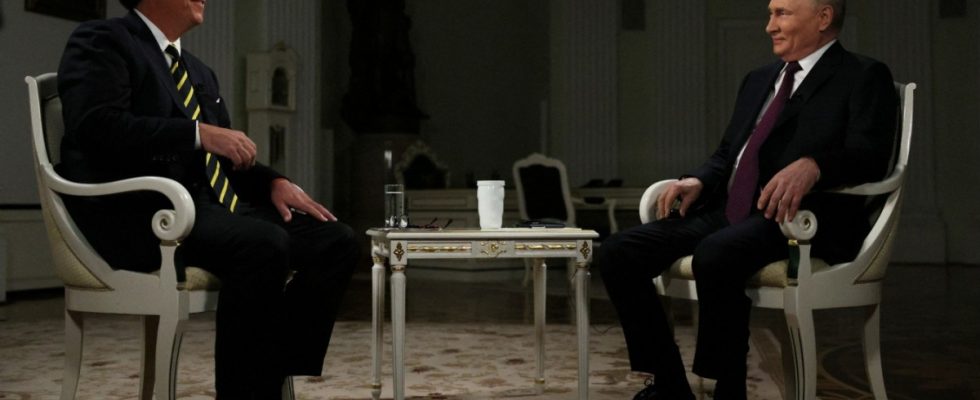It was his first interview with a Western journalist since he gave the order to invade Ukraine. Vladimir Putin took his time with this. The Kremlin chief spoke to the right-wing US moderator Tucker Carlson for 127 minutes, went on too long historical digressions, once again blamed the US for the end of ceasefire negotiations with Ukraine and claimed that he had no intention of attacking a NATO country like him Poland or Latvia. If the West stops supplying weapons to Ukraine, the war “will be over in a few weeks.” None of this was new.
Things got interesting, however, when Carlson asked about the US journalist Evan Gershkovich, who was imprisoned in Russia. Would Putin be willing to let Gershkovich return to his homeland as a “sign of your decency”? Before answering, Putin sighed. “We have shown so many goodwill gestures that there are none left,” he finally claimed.
Prisoners in Germany, Russia and the USA – the deal would be complicated
Then Putin made it clear that he was thinking of a deal rather than a gesture. An agreement is possible if our partners take “mutual steps,” by which Putin of course means a prisoner exchange. US basketball player Brittney Griner, who was convicted of a minor drug offense in Russia, was exchanged for Russian arms dealer Wiktor But, who was imprisoned in the US, in December 2022. There had previously been speculation that another Russian could become part of the deal – Vadim Krasikov, who was convicted and imprisoned in Germany for murder. Putin did not say the name in the interview, but left no doubt that he was exchanging the reporter’s name Wall Street Journal against Krassikov. Such discussions have worked in the past and could be “successful” this time too.
Almost a year in Russian custody: US journalist Evan Gershkovich, here after a court appearance at the end of January, is apparently serving Moscow as an object of exchange.
(Photo: Alexander Zemlianichenko/AP)
That is the question. Ultimately, it is not within the power of the US government to hand over Krassikov, who is imprisoned in Germany and has become known as the “Tiergarten murderer,” to Russia. Krassikov was convicted of murder by the 2nd Criminal Senate of the Berlin Court of Appeal at the beginning of December and is serving a life sentence. The court found it proven that the Russian killed the 40-year-old Georgian Selimchan Changoshvili with three shots in the Kleiner Tiergarten in Berlin in 2019 and was acting on behalf of the Russian state. The murder was apparently an act of revenge by the Russian secret service because Changoshvili had fought against Russian troops in Chechnya. Officially, Russia denies all of this and also insists that the cover identity of the man posing as Vadim Sokolov is the correct one.
A success of this method could lead to new similar cases
The journalist Gershkovich, in turn, was arrested in Yekaterinburg in March 2023 on suspicion of espionage – an accusation that he and the US government firmly deny. The fact that Putin confirms talks about an exchange gives that Wall Street Journal now at least hope. “We are encouraged to see the Russian desire for a deal that brings Evan home,” the newspaper said. It is hoped that this will lead to a quick release and a return “to his family and to our editorial team”. Indeed, Putin said it made no sense to continue holding Gershkovich in a Russian prison. “I would also like to see him return to his homeland. I am absolutely sincere,” Putin said. But the more publicly the matter is discussed, the more difficult it becomes to find a solution.
Putin essentially confirms that the American journalist is nothing more than a bargaining chip for him to use to free a Russian contract killer. Naturally, there is no confirmation from the federal government for talks with the USA and Russia – but that does not mean that such talks are not taking place. It is also not ruled out that the federal government could declare its willingness to exchange for overarching interests. However, this is likely to be preceded by complicated negotiations and considerations. Especially since the success of Putin’s method could lead to new, similar cases in which Russia’s arbitrary justice system is used against Western citizens.
Legally, a deal would probably be possible. According to Section 456a of the Code of Criminal Procedure, it is theoretically possible for enforcement to be dispensed with “in the event of extradition, transfer or expulsion abroad,” said Kai Cornelius, professor of criminal law with international criminal law at the University of Hamburg, to the Reuters news agency.

